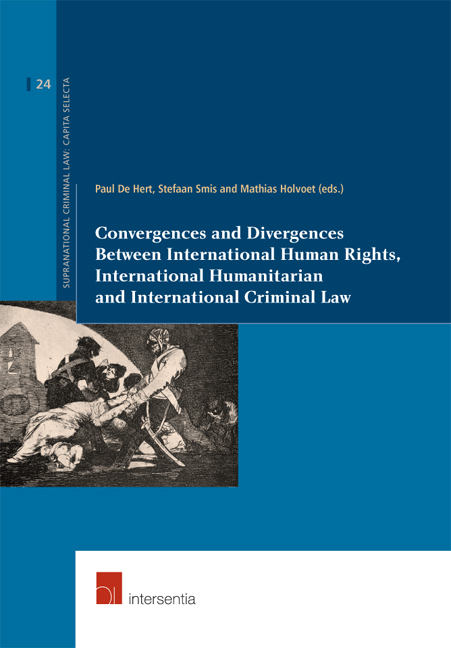Book contents
- Frontmatter
- Foreword
- Preface
- Contents
- About the Contributors
- Part I Convergences and Divergences between International Human Rights Law and International Criminal Law Stricto Sensu
- Part II Convergences and Divergences between International Human Rights Law and Transnational Criminal Law
- Part III Convergences and Divergences between International Human Rights Law and International Humanitarian Law
- ‘It was the Best of Times, it was the Worst of Times’: A Tale of Detention in Time of Emergency
- The European Court of Human Rights’ Approach to Armed Conflict and Humanitarian Law: Ivory Tower or Pas de Deux?
- Prohibitions on Arbitrary Displacement in International Humanitarian Law and Human Rights: A Time and a Place for Everything
- Investigations in Armed Conflict: Understanding the Interaction between International Humanitarian Law and Human Rights Law
- Conclusion
- Index
- About the Editors
Prohibitions on Arbitrary Displacement in International Humanitarian Law and Human Rights: A Time and a Place for Everything
from Part III - Convergences and Divergences between International Human Rights Law and International Humanitarian Law
Published online by Cambridge University Press: 11 October 2018
- Frontmatter
- Foreword
- Preface
- Contents
- About the Contributors
- Part I Convergences and Divergences between International Human Rights Law and International Criminal Law Stricto Sensu
- Part II Convergences and Divergences between International Human Rights Law and Transnational Criminal Law
- Part III Convergences and Divergences between International Human Rights Law and International Humanitarian Law
- ‘It was the Best of Times, it was the Worst of Times’: A Tale of Detention in Time of Emergency
- The European Court of Human Rights’ Approach to Armed Conflict and Humanitarian Law: Ivory Tower or Pas de Deux?
- Prohibitions on Arbitrary Displacement in International Humanitarian Law and Human Rights: A Time and a Place for Everything
- Investigations in Armed Conflict: Understanding the Interaction between International Humanitarian Law and Human Rights Law
- Conclusion
- Index
- About the Editors
Summary
INTRODUCTION
It is largely a settled matter that both international humanitarian law (IHL) and international human rights law (IHRL) have their place in armed conflict. However, there is no single formula governing their exact positioning in relation to each other. This is determined with reference to the specific subject matter, and a number of constellations have been developed to describe varying modes of interaction between IHL and IHRL rules. Some of these indicate greater convergence but, where a clear divergence appears, lex specialis remains an important mechanism to resolve this. Analyses of such interactions between specific, overlapping rules of IHL and IHRL have focused primarily on the use of force and detention. This chapter aims to make a further contribution by examining the relationship between the IHL and IHRL rules prohibiting arbitrary displacement. Though the IHL/IHRL interaction in this subject area has not received extensive attention, a number of legal disparities can be observed that may have consequences in practice, most notably for the assessment of the legality of displacement events in the context of an armed conflict or occupation. In ambiguous situations, a clear analysis of the IHL/IHRL relationship may be key to delineating the difference between a justified measure and a potential war crime on the part of armed forces and their commanders. This will accordingly have implications for the response of actors such as Judges, third State agents, international bodies and aid organisations.
This chapter aims to provide a framework for such an analysis by outlining the normative content of these prohibitions and mapping their interaction in situations in which IHL applies (i.e. international armed conflict (IAC) – both in conduct of hostilities and under occupation – and non-international armed conflict (NIAC)). The above is conducted in light of general principles and models of IHL/IHRL interaction that have been set out previously by scholars.
It will be shown that in the situations examined (i.e. IAC, occupation, and NIAC), more specific IHL rules act as lex specialis. In the conduct of hostilities in IAC, this results in deviation from stricter IHRL norms, in recognition of the specificities of conflict (as is also the case with regard to the right to life in armed conflict). However, the cases of occupation and NIAC represent examples of a less commonly encountered paradigm, in which IHL as lex specialis provides more stringent protection for civilians.
- Type
- Chapter
- Information
- Convergences and Divergences Between International Human Rights, International Humanitarian and International Criminal Law , pp. 223 - 258Publisher: IntersentiaPrint publication year: 2018



